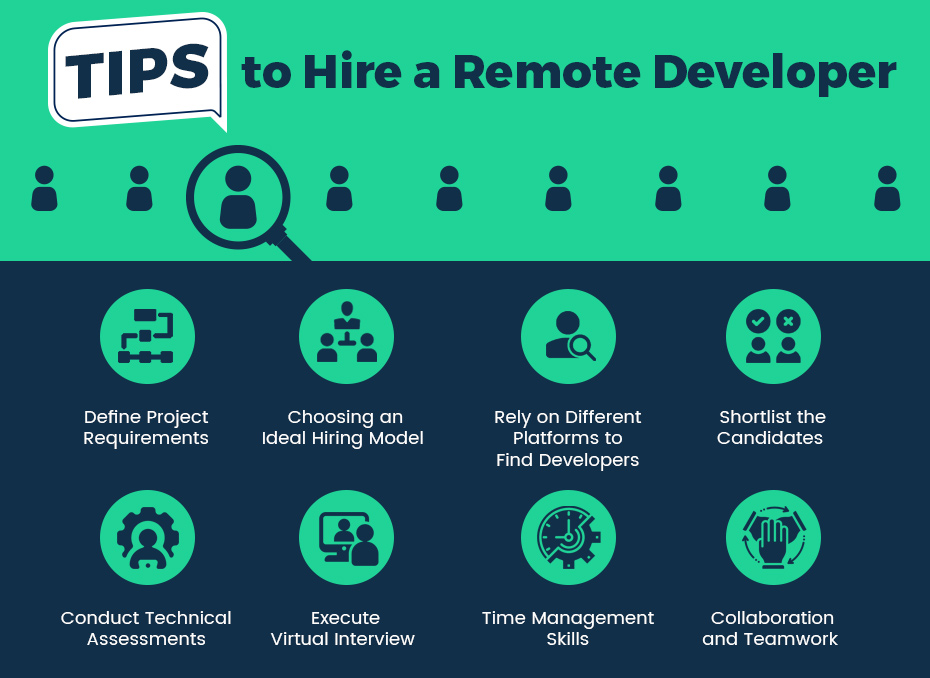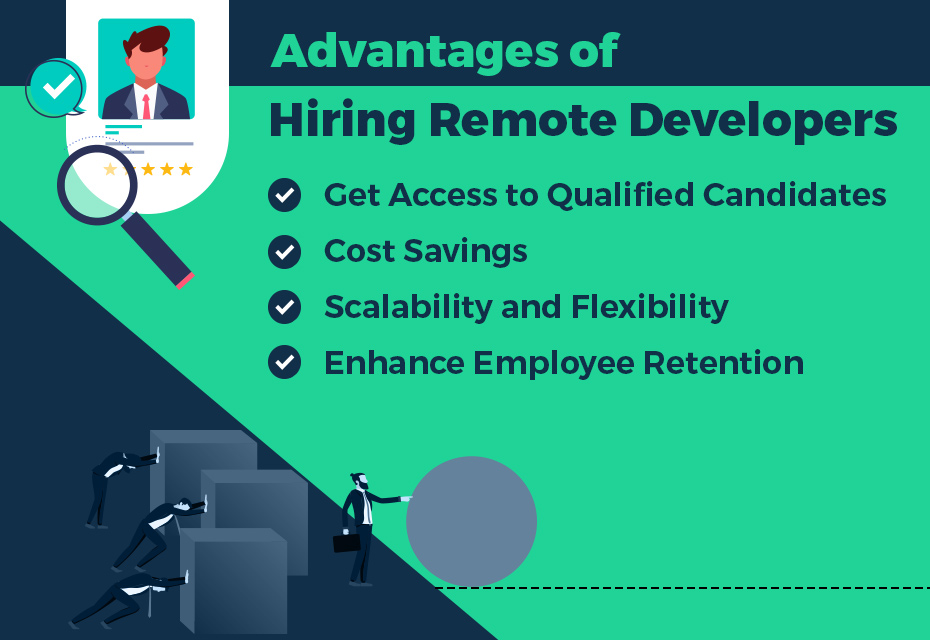
Are you interested in creating a successful software or mobile application? Do you need to hire remote developers who can meet your expectations?
Undoubtedly, the answer is yes. However, we are aware of the challenges involved in finding exceptional remote developers who can truly match your expectations.
Remote, hybrid, and work-from-home are the new normal, and businesses are embracing this change with open hearts.
Whether you own a start-up business thinking to get big, or a giant business that wants to cross a solid benchmark by the year’s end, hiring a team of developers will change your success narrative.
In this blog, we will guide you through the process of hiring the right software developers for your project. By the end, you will have a comprehensive understanding of how to make informed decisions and assemble a stellar development team. So, let's dive right in.
What is a Remote Software Developer?
Currently, work-from-home culture is flourishing, so you’ll find many individuals who are likely to opt for freelance work.
Remote employees communicate with the team virtually, are hired virtually, and may work remotely from any country or city.
They could be full-time employees working for a company for 5 years and more.
If a freelancer employee agrees to take part in a project as per the deadline, he/she becomes the core member of the team; the only distinguishing factor would be their working location.
What are the Responsibilities of Remote Developers?
Designers, UX professionals, and business analysts would collaborate with developers to accomplish certain tasks.
The client must communicate with a project manager to monitor everything - right from understanding the client's vision to incorporating feedback and keeping them informed about the updates.
When you hire remote developers for your project, there should be some guidelines and precise project requirements that need to be met by the remote employee.
Quick Tips to Hire a Remote Developer for Project
Here are some practical and modern-day hiring tips that will do wonders in your hiring process.
1. Define Project Requirements
Ensure you are clear with your project's requirements; this will give you an understanding of finding a suitable candidate.
There are certain things to keep in mind when defining a project checklist;
- Create a list of projects you want to develop, like software, web, or mobile app.
- Decide the budget and timeline of the project.
- Determine the expertise and experience required for the project.
2. Choosing an Ideal Hiring Model
When you are planning to hire remote developers for your software development company, you must pick the right model for your project.
Generally, hiring models are based on the work hours the employee will dedicate to a company.
Engagement models define the relationship and collaboration between businesses and their clients.
There are various types of engagement models tailored to meet specific project requirements.
Each engagement model offers distinct advantages and can be chosen based on project complexity, budget, and desired level of control and flexibility.
There are three main models that have proven to be successful in attracting remote workers. Let’s comprehend them;
- Dedicated Hiring Model
In this model, a company hires a whole team of developers who dedicatedly work for them.
The dedicated development team model involves forming a dedicated team of skilled professionals exclusively for a specific project.
This team becomes an extension of the client's in-house team, working closely with them. It offers flexibility, scalability, and complete control over the project's resources and deliverables, ensuring efficient collaboration and effective communication throughout the development process.
This type of model is mostly useful for long-term projects.
As these developers are highly qualified and experienced, they need minimal guidance to undertake certain projects.
- Hourly Hiring Model
If you have a small and perfectly defined project, it is advisable to work with remote developers on an hourly basis.
On top of that, managers also dedicate their projects on an hourly basis to maintain software, upgrade software, or to fix the existing codes.
Ensure you properly explain your requirements before embarking on this type of collaboration.
- Part-time Hiring Model
Hiring part-time remote developers would be great for small-scale requirements and a limited budget.
Here, only fixed hours are assigned to developers, and the developers work accordingly.
3. Rely on Different Platforms to Find Developers
Once you have decided on the requirements, the second crucial step would be finding sources from which you can find developers.
Check out the sources to find remote developers;
- Job Portals
By utilizing job portals such as Indeed, LinkedIn, and Glassdoor, you can expand your reach to a wide range of developers who are actively seeking job opportunities.
These platforms enable you to post job listings, search for qualified candidates, and directly communicate with potential hires. Leveraging these job boards enhances your chances of connecting with talented developers and finding the right fit for your needs.
- Freelancer Portals
Platforms such as Upwork, Freelancer, and Fiverr serve as websites where businesses can post their project requirements and hire freelancers
These platforms provide access to a diverse pool of developers with varying skill sets and levels of experience.
By reviewing their profiles, portfolios, and client feedback, you can gather valuable information to make well-informed decisions when it comes to hiring the right candidate for your project.
- Social Sites
You can explore some of the popular social networking sites like Facebook, Instagram, or LinkedIn to find suitable resources.
Engage with developer communities, actively participate in relevant groups, and share job opportunities on your social media profiles.
This approach enables you to connect with developers who are actively seeking remote work or may even recommend suitable candidates for your requirements.
- Offshore Development Companies
Various offshore development companies can offer you exceptional staffing services.
Relying on them is a sure-shot formula for hiring quickly & efficiently.
4. Shortlist the Candidates
Once you have shortlisted candidates from different online platforms, next you must prepare a final list of candidates suitable for the job.
At this stage of the hiring, you must select candidates who are most suitable for the project.
Create pre-defined criteria to select the final candidates. Here are certain some criteria you must consider;
- Know if the candidate has the technical skills required for the project.
- Consider the candidate’s experience in the software development domain.
- Know the candidate's salary expectations and whether it aligns with your budget.
- Ensure the communication is seamless for better understanding & clarity.
Every company has policies and unique standards, so ensure the candidate adheres to them.
5. Conduct Technical Assessments
Once you are done with the screening process, the second step is interviewing the candidate individually to make a practical decision.
Use technical assessments or coding challenges to evaluate a candidate's technical skills.
These assessments can include coding exercises, problem-solving tasks, or reviewing their past projects.
This is a crucial part of the hiring process as it mainly focuses on whether the candidate is qualified for the position or not.
It is important for remote programmers to know the values and ethics of the company.
6. Execute Virtual Interview
Conduct thorough virtual interviews to evaluate a candidate's technical abilities, problem-solving skills, and cultural fit.
Use video conferencing tools to simulate face-to-face interactions and assess their non-verbal cues and body language.
7. Time Management Skills
Remote work requires strong time management skills. Ask candidates about their time management strategies, how they prioritize tasks, and how they ensure productivity in a remote setting.
Look for candidates who can effectively manage their workload and meet deadlines.
8. Collaboration and Teamwork
Remote developers need to collaborate effectively with other team members.
Ask behavioral questions during the interview to assess their teamwork skills, ability to work in a distributed team, and their approach to remote collaboration.

Advantages of Hiring Remote Developers for Your Project
Hiring remote developers for your project can offer numerous advantages that contribute to the success and efficiency of your development initiatives.
Here are some key benefits:
1. Get Access to Qualified Candidates
One of the challenges some companies face while hiring is a lack of talent and access to qualified candidates.
We live in a world where most people depend on apps to find a suitable job, so it is important to maximize online job portals.
Most people want to work remotely for various reasons, like some of them are traveling or love their home country and do not plan to relocate.
Remote working offers access to some of the proficient talents from across the world.
2. Cost Savings
Hiring remote developers can lead to significant cost savings.
You can eliminate expenses associated with physical office space, equipment, and infrastructure, as well as reduce overhead costs such as utilities and employee benefits.
Remote developers often work as independent contractors or freelancers, enabling you to scale your team as needed without the long-term financial commitments associated with traditional employment.
Hiring remotely would be a wise investment if you are tight on budget.
3. Scalability and Flexibility
Remote developers offer flexibility in terms of work arrangements and schedules. They are accustomed to working in distributed environments and can adapt to different time zones.
This flexibility allows for efficient collaboration across teams and enables you to maintain productivity around the clock, ensuring faster development cycles and timely project deliveries.
Moreover, employers seek good results, while developers love their freedom, and thus they remain more productive and actively participate in the projects.
4. Enhance Employee Retention
Every company planning to hire remotely must have policies that enhance employee retention.
When a top performer leaves the company, the Human resources department needs to spend subsequent time and resources to find a replacement.
Therefore, to thrive in a business, you need a solid team of employees who stay loyal to the company.
When the employees are given the opportunity to work from anywhere, they remain more productive, which positively impacts their mindset to be associated with the company for a longer period of time.
Parting Thoughts
In conclusion, opting to hire remote developers can strategically benefit your project in numerous ways. Embracing the remote work model grants you access to a global talent pool, enabling you to find the ideal match for your project requirements.
The cost savings, increased flexibility, and enhanced productivity associated with remote work significantly contribute to the efficiency and success of your development initiatives.
Moreover, the diverse perspectives and innovative ideas brought by remote developers can drive your project forward and give it a competitive edge. The scalability and faster hiring process offered by remote hiring allow you to swiftly adapt to evolving project demands and meet deadlines with ease.
Additionally, the improved work-life balance experienced by remote developers leads to higher job satisfaction and better retention rates.
Ultimately, by embracing the advantages of hiring remote developers, you position your project for success, benefiting from a talented and dedicated development team capable of delivering exceptional results.
Let Talent By Netclues help you to hire remote developers, so you can fabricate business strategies to create a million-dollar business.
We hope this article will help you make an informed decision to engage developers remotely and how it positively impacts the overall business outcome.






